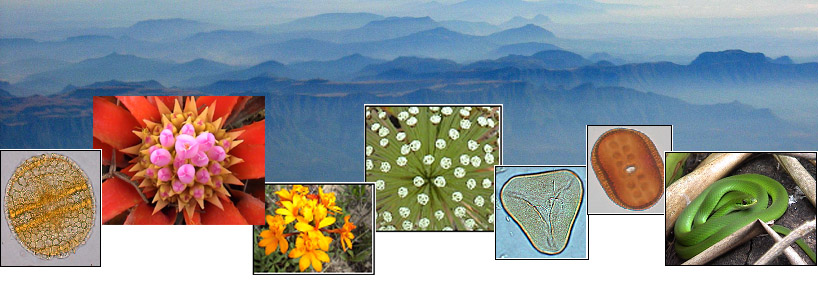
Abteilung Palynologie und Klimadynamik
des Albrecht-von-Haller-Institutes für Pflanzenwissenschaften
der Georg-August-Universität Göttingen
| Startseite | |
| Institut | |
| Abteilung | |
| Forschung | |
| Lehre | |
| Aktuelles | |
| Datenbanken | |
| Publikationen | |
| Interner Bereich | |
| Anreise | |
| Stellenangebote | |
| Links | |
| Impressum | |
|
Course: Multivariate Analysis in
Paleoecology Prof.
Dr. Valério De Patta Pillar
Departamento
de
Ecologia, Universidade Federal do Rio Grande do Sul Porto
Alegre, RS,
Brazil am 19. – 23. 6.
2006, 9:00 –
16:00 Uhr im Schulungsraum der UB Multivariate analysis
methods can help disentangle past vegetation and
ecosystem processes often hidden in the complexities of paleoecological
data.
This short introductory course will emphasize the analysis of pollen
and other
plant remnant records from dated sediment cores. The topics include (1)
a
review on multivariate analysis (data types, distance and diversity
measures,
analysis of contingency tables, ordination methods), (2) its
application in the
description of trajectories of vegetation change in pollen profiles,
(3) the
interpretation of these in terms of phase structure, transition
velocity and
acceleration, and diversity in relation to climate, anthropogenic
forcing and
charcoal records, and (4) the analysis of synchronicity between pollen
profiles
and proxy global temperature records by canonical serial scaling. The
course
will emphasize hands-on understanding of data analysis and
interpretation using
SYNCSA software (http://ecoqua.ecologia.ufrgs.br/ ). Bibliography
Orlóci, L., Pillar, V.D., Anand, M. 2006. Multiscale analysis of palynological records: new possibilities. Community Ecology 7: 53-67. Behling, H., V.D. Pillar, L. Orlóci & S.G. Bauermann. 2004. Late Quaternary Araucaria forest, grassland ( Behling,
H., V.D. Pillar & Bauermann, S.G. 2005.
Late Quaternary grassland (Campos), gallery forest, fire and climate
dynamics,
studied by pollen, charcoal and multivariate analysis of the São
Francisco de
Assis core in western Rio Grande do Sul (southern Brazil). Review
of Palaeobotany and Palynology
133(3-4): 235–
248. Behling,
H., Pillar, V. D.,
Müller, S. C. & Overbeck, G. E. 2006. Late-Holocene
fire history in a forest-grassland mosaic in southern Behling,
H. & Pillar,
V.D. Late Quaternary vegetation, biodiversity and fire dynamics on the
southern
Brazilian highland and their implication for conservation and
management of
modern Araucaria forest and grassland ecosystems. Philosophical
Transactions of
the Royal Society B: Biological Sciences (Accepted) Die
Teilnehmerzahl ist auf 12
begrenzt. Anmeldung
bitte bis zum 9. 6.
2006 bei Frau Grothmann E-Mail:
ugrothm@gwdg.de oder Tel.: 0551 39-5733
|
Seminar zur vegetationskundlich-pflanzengeografischen und vegetationsgeschichtlichen Exkursion nach Brasilien Das südliche Brasilien, bzw. die
Region der „Mata Atlantica“ gehört zu den „hot spots“ der
Biodiversität und sicherlich auch mit zu den interessantesten
tropischen und subtropischen Ökosystemen dieser Erde. Dazu
gehören u.a. die Atlantischen Regenwälder, Nebelwälder,
Restinga (Küstenvegetation), Araukarienwälder und der
artenreiche Campos (Grasländer).
Für das Wintersemester 2006/2007, voraussichtlich die ersten 2-3 Wochen im Oktober, ist eine vegetationskundlich-pflanzengeografische und vegetations-geschichtliche Exkursion zusammen mit brasilianischen Studenten ins südliche Brasilien geplant. Zu dieser Exkursion findet im SS 2006 ein vorbereitendes Seminar statt. Interessierte am Seminar und an der Exkursion sollten zur Vorbesprechung am 24. April 2006 um 16:15 Uhr in den kleinen Hörsaal der Unteren Karspüle 2 kommen. Die Teilnehmerzahl ist auf 10 begrenzt. S, 1 SWS; ECTS: 1,5; Blockveranstaltung nach Vereinbarung, Vorbesprechung: 24. 4. 2006 um 16:15 Uhr im kleinen Hörsaal des AvH, Untere Karspüle 2, BIO D ab 5, Bio G ab 5, BIODIV BSc/MSc ab 5(evtl. GEO D ab 5, GEG D ab 5, UWG ab 5) |